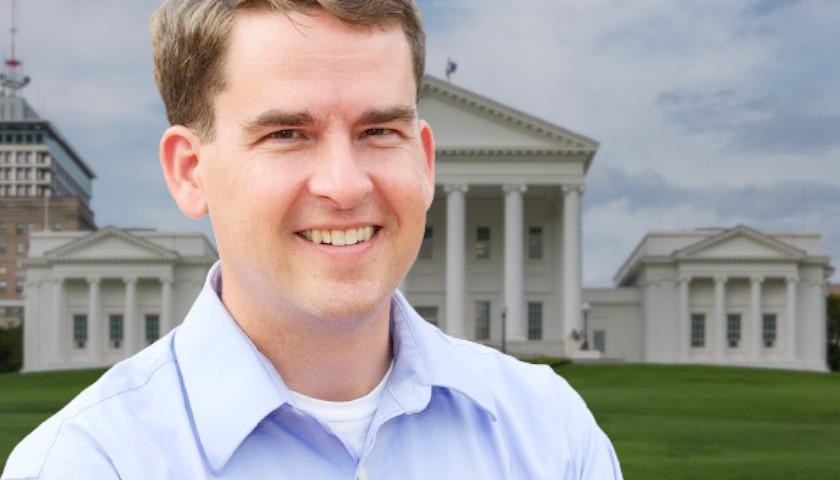The Senate and House of Delegates met separately in Richmond Tuesday, officially kicking off the special session of the General Assembly.
Despite a bevy of bills and promises of swift action, the House and Senate primarily discussed operation and procedural resolutions for the special session going forward.
Both state bodies began their respective sessions at 1 p.m. today, with the House convening at the Siegel Center on the Virginia Commonwealth University campus and the Senate convening at the Science Museum of Virginia.
Here are details of what happened in both chambers.
In the Senate, the first order of business was on Senate Resolution (SR) 503, introduced by Sen. Locke (D-2). SR 503 pertains to senators receiving session per diem and mileage reimbursement for attended sessions on the schedule where roll call is taken, etc., according to the resolution’s online summary.
The Senate took up the resolution for immediate consideration ( 37-Y 2-N), and then agreed upon the resolution (34-Y 5-N).
The House’s first point of business was on House Joint Resolution (HJR) 5006, introduced by Majority Leader Herring (D-Alexandria City). HJR 5006 limits legislation to be considered during the special session to only bills or resolutions pertaining to police reform, criminal and social justice reform, COVID-19, the budget, General Assembly procedures, etc., as well as stating that each Delegate cannot introduce more than three bills, according to the resolution’s online summary.
The House initially agreed to HJR 5006, but some members were not able to vote using the new machines. In reconsideration, the House agree upon the resolution (Y-55 N-43 A-0).
The House then moved on to considering HR 514, also introduced by Majority Leader Herring, which aimed to amend and readopt Rule 4 of the House of Delegates, allowing the House or any committees to meet electronically during an emergency or disaster, according to the resolution’s online summary.
Del. Herring also made a motion to suspend rule 81 of the House, a proposition for a House rule change must sit on the speaker’s table for five days and can be up for consideration after that period of time, so that the body could immediately consider HR 514.
Suspending rules of the House requires 66 affirmative votes, or two thirds of the members. Del. Herring’s motion for HR 514 to be immediately considered was rejected (Y-55 N-43 A-0).
After Herring called for a short recess, she made another motion trying to suspend rule 18(e) so that members attending sessions electronically could be counted for the purposes of a quorum, allowing proceedings to be valid. That motion was rejected as well (Y-54 N-43 A-1).
The Senate reconvened at 2:45 p.m., after taking a 30 minute recess, and was informed that the House had passed the aforementioned HJR 5006. The resolution was taken up for immediate consideration (37-Y 0-N) and promptly rejected (0-Y 40-N).
The Senate adjourned at 3:14 p.m. to reconvene tomorrow at noon.
Over at the Siegel Center, the House was still in session, however.
Following the trend of the entire day, the House considered another resolution introduced by Del. Herring – HR 515 – that would give the speaker authority to make any session during the 2020 special session to be conducted electronically, according to the resolution’s online summary. Delegates agreed to HR 515 (Y-55 N-43 A-0).
HR 516, the penultimate resolution considered and agreed upon by the House (Y-54 N-44 A-O), was introduced by Del. Luke Torian (D-52). Identical to only resolution passed by the Senate, HR 516 states that members of the House will receive session per diem for any day the attend a schedule session where a roll call is taken during the special session, according to the resolution’s online summary.
HR 516 was agreed upon by Delegates (Y-54 N-44 A-O).
In response to the Senate rejecting HJR 5006, Del. Herring offered HR 517 with the exact same language and amendments, but only for the House. HR 517 was agreed upon by the House (Y-54 N-44 A-0).
The house adjourned at 5:02 p.m. to reconvene electronically tomorrow at noon.
House Minority Leader Del. C. Todd Gilbert (R-Shenandoah) issued a strong rebuke toward House Democrats and their handling of today’s session, referencing multiple resolutions that were passed such as HR 516.
“Today was a dark day for the House of Delegates,” Del. Gilbert said in a statement. “The Democratic majority abandoned 400 years of tradition and rule of law so that they could avoid public scrutiny of their far left wing agenda — and demanded a $210 travel allowance to do so from the comfort of their couches.”
Del. Gilbert also demanded that the House operate in the public eye, instead of conducting sessions online, where constituents can show up to committee meetings and make their opinions heard by members.
Although the Senate and House did not immediately begin voting on some of the member’s hot-topic bills, like removing qualified immunity for law enforcement officers, the special session today was the first step for the General Assembly in its efforts to help Virginia during desperate times.
– – –
Jacob Taylor is a reporter at The Virginia Star and the Star News Network. Follow Jacob on Twitter. Email tips to [email protected].
Photo “Virginia State Capitol” by Ron Cogswell. CC BY 2.0.





